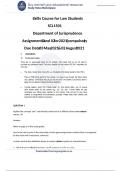Skills Course for Law Students
SCL1501
Department of Jurisprudence
Assignment10and 02for2021(compulsory
)
Due Date:03 May2021& 02 August2021
QUESTION 1
Explain the concept ‘law” and thereby show how it is different from otherrules
socialor
norms. (4)
Answer:
Refer to page 2 of the study guide:
Law in the strict sense is the only body of rules governing human conduct that is recognised
by the state and if necessary, enforced.
A closer look at this definition shows a number of
portant
im points or characteristics:
Downloaded
• law is a system from
ofrules (however, not allwww.legumguide.co.za
systems of rules are law);
• the rules are recognised bythe state(not religion, science, or sporting codes);
,• the rules are meant to control human actions (in relation to society, things, the
environment);
• the rules are enforceable.
The concept of “law” entails different views of rules, norms and what ought to be. The rules
are recognised by the state (not religion, science, or sporting codes). A norm is standard of
human conduct or a rule of human behaviour and cannot be enforced by the state However,
the difference between norms and law is that with laws the whole community is affected.
This means everyone will have to abide to the laws. Social rules or norms are codes that
only affect an individuals or a small group of people.
Very often legal and moral norms are separate i.e. if you commit adultery you won’t be
sentenced to prison of have to pay a fine, you have to live with your conscience, however
committing murder is a norm applied both legally and morally.
QUESTION 2
2.1 “State” is a non-physical entity, an abstract notion or phenomenon created by citizens
through their deemed agreement (i.e. social contract).
(a) In the light of the above statement, explain the concept “state” fully, and say why the
agreement by citizens in this regard is said to be “deemed”. (4)
Answer:
A State is an abstract, non-physical or conceptual entity where a nation (people with
common identity) belongs. It ideally remains unchanged Therefore, the extract illustrates
the idea that citizens do play a role in the preservation of law and order in a democratic
state. The basis for this role is the notion of a “social contract” which all citizens are deemed
to have signed or agreed to in order to determine how they will live with one another, and
thus create a sense of order, certainty and protection. The rule of law is therefore the basis
upon which the social contract is premised.
Generally, the term “social contract” refers to a situation where citizens have willingly come
together and agreed to a set of rules in terms of which their lives will be organised, and thus
create a sense of order, certainty and protection. It is in this regard that a state of “rule of
law” is created. It is through a social contract that all citizens are deemed to have agreed to
a set of rules or laws in order to create peace and order.
2.2 “However, we need to examine our environment, and ask problematic questions such as,
“whose law?” Obviously, it’s the law of the dominant class in that society (Study Guide, p.7)
Which class does the South African law, including the constitution, serve? Explain fully. (3)
, Answer:
Laws made by the legislative wing of government, such laws bind all citizens in the country
and everyone living with the borders of South Africa. The Law protects rights from between
tampered with thus preserves harmony in the social order by maintaining the equilibrium
between the individual’s interests and those of the government.
The Constitution ensures that the human rights of individuals will be safeguarded from
random intrusions by the state, other individuals, groups and other dominant organisations.
A legal system is created by the citizens and is essentially meant to serve them. It is in this
sense that we normally say that a legal system derives its legitimacy and life from the fact
that the citizens agree to be controlled or bound by the system in what may be referred to
as a social contract.
QUESTION 3
3.1 Read the “Lephepane Village” story on page 10 of your Study Guide and use it as an
anchor for your explanation of the notion of “praxis”. (5)
Answer:
Paul Freire defines praxis as the notion which requires that every aspect of knowledge
should be accompanied by application or action. According to the notion (of praxis), what is
required is active reflection and reflective action.
From the Lephepane Village story, it is not enough to get that qualification, but rather what
is important is to be able to use that qualification effectively when the situation demands it.
A key factor for a subjective being is the ability to reflect. That is why “praxis” is said to
encompass “action and reflection”, and therefore becomes a reflective practice.
3.2 Refer to Kgalema Motlanthe’s remarks (see learning unit 2) in your Study Guide and do
activity 2.2. (8)
Answer:
What is the central message that Kgalema Motlanthe sends through this text
The extract (by Kgalema Motlanthe) is centred on this important aspect that characterises
human beings. According to Motlanthe, reflection is the main element that separates
human beings from robots and parrots. It is in this context that he emphasises the point that
in the absence of (self)reflection, individuals are no different from non-human beings (e.g.
robots and parrots). In other words, we lose our personhood and become “depersonalised”.
Indeed, a robotic or parrotic mind cannot question/interrogate, take ownership of
information, relate facts to relevant authentic or practical situations and engage/dialogue
on the information.




